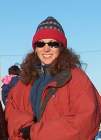 |
|
|
| Author |
Message |
Misty_Nikula-Ohlsen

Joined: 23 Mar 2004
Posts: 74
Location: Barrow, AK

|
 Posted:
Thu Jul 22, 2004 5:21 am Posted:
Thu Jul 22, 2004 5:21 am |
  |
This morning we got up early to eat breakfast and then tried to determine where we could meet the small boat from the Canadian Icebreaker, Sir Wilfrid Laurier, to go aboard for a boat tour. We found out from Glenn Sheehan, the BASC director, that the ship would look for people on the shore, directly opposite the ship, near the top of each hour. So off we went to downtown Barrow with 7 people in the truck. We waited for about 15 minutes on the beach and then we saw someone coming ashore in the zodiac.

Zodiac comes ashore from the Sir Wilfrid Laurier
Four of us, Torsten, Marcus, Heather and me, got into the zodiac first and put on our life preservers. Ivan, the zodiac driver, quickly whisked us to the ship, where we came up the gangway and were met by Rebecca, a member of the Canadian Coast Guard. Rebecca took us on a tour of the ship beginning at the foredeck, where there is a large working area and many cranes for deploying buoys, plankton nets (called Bongos), moored instruments, etc.

Foredeck of the Sir Wilfrid Laurier
Next, we walked around to the aft of the ship and went inside the helicopter hangar. The Canadian Coast Guard uses the helicopter not only for search and rescue operations, but also to transport people and supplies to and from shore when they are near ports or to resupply lighthouses and small villages on coastal Canada.

The helicopter in its hangar
After that we walked through some of the science lab areas and crew quarters. On our way we saw the emergency evacuation life boat. It can hold 60 people, is self-righting when it hits the water and has its own water deluge to protect it if the ship were on fire.

Emergency evacuation life boat
Next, we went up to the bridge, where the steering and navigation of the ship are controlled.

The bridge of the Sir Wilfrid Laurier
Rebecca showed us where the steering is controlled, the fire and smoke alarm panel, and the satellite images of the ice pack that they use to fine tune their path through the Arctic, as well as some of the other equipment on the bridge.

Satellite ice images show up on computer screens so navigators can set a course
Lastly, we toured the engine room. Harly, a Coast Guard engineer, walked us through the areas that hold the diesel engines, electric turbines, desalinators, incinerator, and oily water separators that all are part of the “guts” of the ship.

One of the Laurier's diesel engines
After another trip through the foredeck with Rebecca, we waited for the zodiac to come back and were ferried back to shore.

Gangway to the zodiac

Good-bye, Sir Wilfrid Laurier!
After lunch, we headed out to BEO to download the data and take the soil moisture and thaw depth measurements for this week. Boy, was it a hot day! I am not kidding! It must have been at least 55 F and little to no wind! Of course, we were still wearing our thermals and about 4 layers of clothes, but STILL! The jackets were soon removed, but then that left you at the mercy of the mosquitoes. (Luckily, I seem to have an inherent, natural mosquito repellent, and the mosquitoes don’t bother me much.  ) )
After we finished our field work, we drove about 20 miles further out of town down Cake Eater Rd (the one that we take to get to BEO). We had heard that there were herds of caribou down there and sure enough, there were! Of course, they were at least 5 miles away, so all we could see were small brown blobs scurrying around near the horizon. They were almost lost in the heat waves, but definitely caribou. Can you see them in this super zoomed picture?

Caribou herd on the horizon
Tonight, we are going to see to head down again and see if we can see more. If I get any better pictures, you, my loyal In’ll be one of the first to see them! |
|
|
     |
 |
|
|
|
View next topic
View previous topic
You cannot post new topics in this forum
You cannot reply to topics in this forum
You cannot edit your posts in this forum
You cannot delete your posts in this forum
You cannot vote in polls in this forum
You cannot attach files in this forum
You can download files in this forum
|
Powered by phpBB 2.0.11
© 2001, 2002 phpBB Group :: FI Theme ::
All times are GMT
| |
